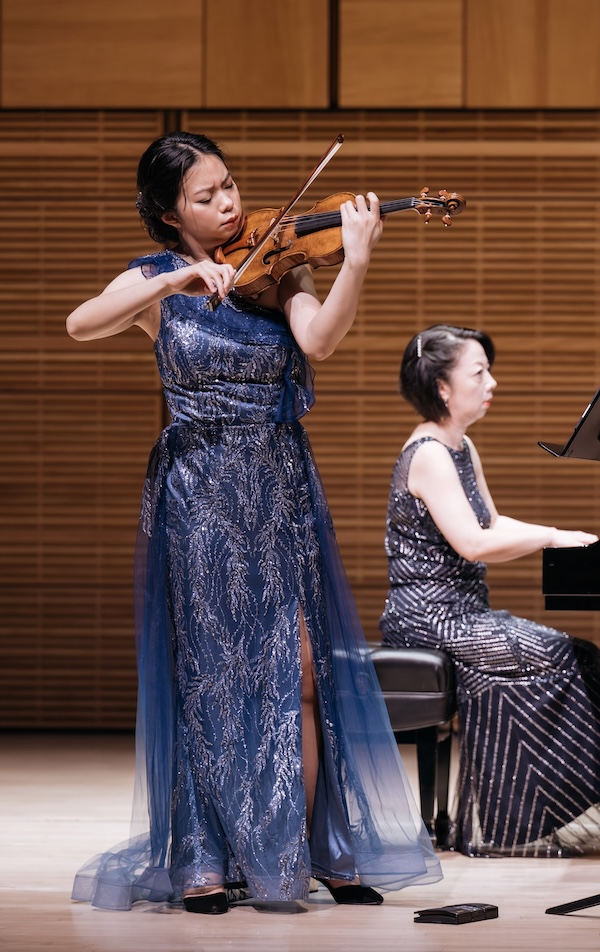Gold medalist Huang roams far and wide, brilliantly, in Zankel Hall recital

Whatever alignment of the planets caused the reigning gold medalists of America’s two most prestigious music competitions to give their Carnegie Hall recitals on successive nights this week, it made for rewarding and enlightening listening here in Gotham.
First up was the young Romantic concerto god Yunchan Lim, winner of the 2022 Van Cliburn Competition for pianists, scaling a Baroque peak, Bach’s “Goldberg” Variations, Friday night in Stern Auditorium.
The following night belonged to Sirena Huang, who topped the field at the 2022 International Violin Competition of Indianapolis, superbly performing a culturally diverse, artfully constructed program with pianist Chih-Yi Chen in Carnegie’s more intimate Zankel Hall.
Taken together, these performances exploded the notion that competition winners are bland automatons whose main virtue is playing the hardest music without missing a note, and who confine their repertoire to familiar virtuoso pieces.
That said, Huang and Chen did start their program with one of the most familiar of violin recital items, Stravinsky’s Suite italienne. These excerpts in neoclassical style from the ballet Pulcinella, arranged by the composer and the violinist Samuel Dushkin for one of their recital tours, show Stravinsky at his most ingratiating. The Taiwan-born violinist’s full tone and elegant phrasing put this attractive music across with charm and flair.
Stravinsky didn’t spare the pianist (originally himself) in brilliant movements like the Tarantella, and Chen’s robust partnering here and throughout the program gave the phrase “collaborative pianist” the prestige it deserves. Not every good pianist is a good collaborative pianist, but those seeking to become one might do well to take Chen’s course in it at Indiana University, where she is a longtime faculty member. (Although the IVCI presented this recital as a showcase for its winning violinist, Huang and Chen received equal billing in publicity and the printed program.)
Poulenc’s Violin Sonata is far less familiar to audiences than the Stravinsky piece, despite the composer’s reputation for jaunty, appealing music—or maybe because of it, as this musical memorial to the poet Garcia Lorca, composed during World War II, contains some of his darker thoughts.
Huang and Chen responded vividly to the shifting moods of the sonata’s opening Allegro con fuoco. The central Intermezzo pulsed with soft piano chords, as the ripe-toned violin sang a jazz ballad in glowing thirds. The finale, marked Presto tragico, began as a furious piano toccata on descending chromatic lines while the violin commented acerbically with fast string-crossing and pizzicato, but eventually fell into lugubrious depths, and finally closed amid enigmatic pauses and exclamations.
After an intermission to recover from Poulenc’s dark vision, the program got a fresh start with an innovative piece by the young Beethoven, his Violin Sonata No. 1 in D major, Op. 12. The innovation in this “sonata for pianoforte with violin accompaniment” was the composer’s evident effort to equalize the two instruments’ roles as they took turns with themes and brilliant passagework in the Allegro con brio.
Similarly, the middle movement, a theme and variations, swung the spotlight between the instruments as variations fast and slow, calm and dramatic, tumbled out. The Rondo finale, with its swinging, syncopated theme, bubbled with wit.
In a program essay, Huang described her love of music by Stravinsky, Poulenc and Beethoven since childhood, but also her later need to venture beyond the European classical tradition, impelled by “growth in consciousness around systems of power and privilege.”
She cited the Black Lives Matter movement as inspiring “my journey to examine my cultural conditioning as a musician and to discover the rich history of marginalized composers.” Music by three such figures—the African-American Coleridge-Taylor Perkinson, the African-British Samuel Coleridge-Taylor and the Chinese Chen Gang—made up the latter third of her program.
The three movements of Perkinson’s vivid violin solo Blue/s Forms led off with “Plain Blue/s,” a sliding, groaning monologue rich in blue notes. “Just Blue/s” for muted violin spoke in short, tender phrases, while “Jettin’ Blue/s” was as fast as the title implied, humorous but with rage simmering under its virtuosity, coming to a breathless finish.
Coleridge-Taylor, a contemporary of Delius and Vaughan Williams, composed a piano nocturne based on the spiritual “Deep River,” from which the violinist Maud Powell made the violin-and-piano arrangement performed Saturday night. It provided a sweet-toned interlude between more assertive cultural statements.
Huang’s conscientious program essay allowed for a touch of skepticism about Chen Gang, a Chinese composer from the Han ethnic majority (best known for his Butterfly Lovers Concerto), writing music inspired by the Tajiks of western China. Such fastidious thoughts were quickly banished by piano flourishes of Arabic character and a passionate modal melody high and low on the violin.
A flashy violin cadenza introduced a fast syncopated dance, in which a Chinese composer, visiting a Silk Road community on the frontier, somehow came up with music that sounded for all the world like a Roma (“gypsy”) band in a Budapest café. Those distinctions too were forgotten as violinist and pianist accelerated to blinding speed, bringing this thoughtful recital to a riotous close.
Or almost close. African and Hungarian connections continued into the encores, where the “Mélodie” from Tchaikovsky’s Souvenir d’un lieu cher was followed by “Black Gypsy,” composed by the Budapest-trained classical-turned-jazz violinist Eddie South.
Carnegie Hall presents violinist Anne-Sophie Mutter, cellist Pablo Ferrández and pianist Yefim Bronfman performing trios by Beethoven and Tchaikovsky, 8 p.m. May 6. carnegiehall.org